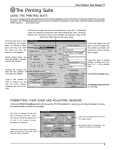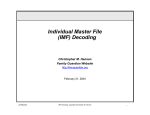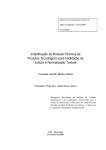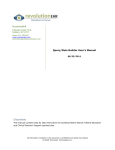Download PDF Version of this Document
Transcript
About E-Verify
ABOUT E-VERIFY
FORM #04.107
PDF Version of this Document
TABLE OF CONTENTS:
1. Introduction
2. Traps to Avoid when Confronting Illegal or COMPELLED use of the E-Verify System
2.1 Confusing PUBLIC "employers" with PRIVATE employers/companies
2.2 Confusing CONSTITUTIONAL aliens with STATUTORY aliens
3. Cases where E-Verify Cannot Lawfully be Used
4. Compelled Use of Social Security Numbers or Taxpayer Identification Numbers by Companies
5. How to Complete E-Verify When Compelled
6. Situational Resources Relating to E-Verify
6.1 Asked to fill out an I-9
6.2 Asked for a Social Security Number for E-Verify 7. Forum discussions of this form
8. Further Reading and Research
1. Introduction
Those seeking work as nonresident alien non-individuals are sometimes asked by companies to participate in the E-Verify system
as part of the job application process. E-Verify is a method of online eligibility checking for those seeking "employment". It:
1. Uses SSA records to verify the validity of the SSN provided with the employment application.
2. Verifies the eligibility of "new hires" for "employment" in accordance with the Illegal Immigration Reform and Immigrant Responsibility
Act (IIRIRA).
E-Verify information is shared with:
1. Department of Homeland Security (DHS).
2. Social Security Administration (SSA).
By the admission of the USCIS, participation in the E-Verify system is entirely voluntary:
Am I required to participate?
No. Under federal law, E-Verify is voluntary for all employers with limited exceptions for federal
government employers and violators of certain immigration laws that are ordered to participate.
Employers should check to see if their state law requires participation in E-Verify.
[How Do I Use E-Verify - "How Do I" Guide for Employers (August 2008), p. 1;
SOURCE: http://www.uscis.gov/USCIS/Resources/E4en.pdf]
Because program participation is voluntary for "employers", participation must by implication be EQUALLY voluntary for "new
hires". If you would like further information on this subject, please see:
Federal and State Tax Withholding Options for Private Employers, Form #09.001, Section 24.6
DIRECT LINK: http://sedm.org/Forms/09-Procs/FedStateWHOptions.pdf
2. Traps to Avoid when confronting illegal or COMPELLED use of the E-Verify system
2.1 Confusing PUBLIC "employers" with PRIVATE employers/companies
http://sedm.org/Forms/04-Tax/Procedure/E-Verify/E-Verify.htm[12/5/2014 2:01:53 PM]
About E-Verify
None of the literature available from the E-Verify Program website:
1. Provides an accurate definition of "employer" for the purposes of the Illegal Immigration Reform and Immigrant Responsibility Act
(IIRIRA).
2. Tells you the WHOLE truth about the fact that you aren't allowed to rely on anything a government representive tells you about what the
law says. Click here for details.
3. Tells you the WHOLE truth about the fact that the government has no legal authority to regulate PRIVATE conduct, and therefore
PRIVATE companies. Click here for details.
The written law is therefore the ONLY accurate and reliable source for what the word "employer" means.
Within Title 26 of the United States Code, the following definition of "employer" is provided for the purposes of the national income
tax:
TITLE 26 > Subtitle C > CHAPTER 24 > § 3401
§ 3401. Definitions
(d) Employer
For purposes of this chapter, the term “employer” means the person for whom an
individual performs or performed any service, of whatever nature, as the employee
of such person, except that—
(1) if the person for whom the individual performs or performed the services does not
have control of the payment of the wages for such services, the term “employer” (except
for purposes of subsection (a)) means the person having control of the payment of such
wages, and
(2) in the case of a person paying wages on behalf of a nonresident alien individual,
foreign partnership, or foreign corporation, not engaged in trade or business within the
United States, the term “employer” (except for purposes of subsection (a)) means such
person.
So in other words, you aren't an "employer" unless you have "employees". The term "employee" is then defined as follows:
26 C.F.R. §31.3401(c )-1 Employee:
"...the term [employee] includes officers and employees, whether elected or appointed,
of the United States, a [federal] State, Territory, Puerto Rico or any political
subdivision, thereof, or the District of Columbia, or any agency or
instrumentality of any one or more of the foregoing. The term 'employee' also
includes an officer of a corporation."
26 U.S.C. Sec. 3401(c ) Employee
For purposes of this chapter, the term ''employee'' includes [is limited to] an
officer, employee, or elected official of the United States, a State, or any political
subdivision thereof, or the District of Columbia, or any agency or instrumentality
of any one or more of the foregoing. The term ''employee'' also includes an
officer of a corporation.
Consequently, those who are not acting as instrumentalities of the national government are NOT STATUTORY "employees". This
would include ALL PRIVATE companies or PRIVATE, non-statutory "employers". For further exhaustive details on this subject,
see:
Why Your Govenrment is Either a Thief or You are a "Public Officer" for Income Tax Purposes, Form #05.008
DIRECT LINK: http://sedm.org/Forms/05-MemLaw/WhyThiefOrPubOfficer.pdf
FORMS PAGE: http://sedm.org/Forms/FormIndex.htm
In their defense, govenrment workers will attempt to deceive you about the above with the following FRAUDULENT arguments:
1. That the use of the word "includes" allows them to add whatever they want to any definition that uses is.
http://sedm.org/Forms/04-Tax/Procedure/E-Verify/E-Verify.htm[12/5/2014 2:01:53 PM]
About E-Verify
2. That what appears in the statute ADDS to the ordinary meaning of the term.
The courts and the rules of statutory construction clearly forbid such deceitful and covetous and CRIMINAL tactics. Here is why:
1. The Rules of Statutory Construction say the following:
“Expressio unius est exclusio alterius. A maxim of statutory interpretation meaning that
the expression of one thing is the exclusion of another. Burgin v. Forbes, 293 Ky. 456,
169 S.W.2d 321, 325; Newblock v. Bowles, 170 Okl. 487, 40 P.2d 1097, 1100. Mention of
one thing implies exclusion of another. When certain persons or things are specified in a
law, contract, or will, an intention to exclude all others from its operation may be inferred. Under
this maxim, if statute specifies one exception to a general rule or assumes to specify the effects
of a certain provision, other exceptions or effects are excluded.”
[Black’s Law Dictionary, Sixth Edition, p. 581]
2. The U.S. Superme Court held the following on this subject:
"When a statute includes an explicit definition, we must follow that definition, even if it
varies from that term's ordinary meaning. Meese v. Keene, 481 U.S. 465, 484-485 (1987)
("It is axiomatic that the statutory definition of the term excludes unstated meanings of that
term"); Colautti v. Franklin, 439 U.S. at 392-393, n. 10 ("As a rule, `a definition which declares
what a term "means" . . . excludes any meaning that is not stated'"); Western Union Telegraph
Co. v. Lenroot, 323 U.S. 490, 502 (1945) ; Fox v. Standard Oil Co. of N.J., 294 U.S. 87, 95-96
(1935) (Cardozo, J.); see also 2A N. Singer, Sutherland on Statutes and Statutory Construction
§ 47.07, p. 152, and n. 10 (5th ed. 1992) (collecting cases). That is to say, the statute, read "as
a whole," post at 998 [530 U.S. 943] (THOMAS, J., dissenting), leads the reader to a definition.
That definition does not include the Attorney General's restriction -- "the child up to the head."
Its words, "substantial portion," indicate the contrary." [Stenberg v. Carhart, 530 U.S. 914 (2000)]
For further exhaustive information on how to combat the CRIMINAL ABUSE of language so as to turn LAW into PROPAGANDA,
see:
Meaning of the Words "includes" and "including", Form #05.014
DIRECT LINK: http://sedm.org/Forms/05-MemLaw/Includes.pdf
FORMS PAGE: http://sedm.org/Forms/FormIndex.htm
2.2 Confusing CONSTITUTIONAL "aliens" with STATUTORY "aliens"
The authority for implementing E-Verify is 8 U.S.C. §1324, which makes it a crime to harbor or aid a CONSTITUTIONAL alien
(foreign national) but not a STATUTORY alien (foreign national OR state national).
It is VERY important that you understand the distinction between "CONSTITUTIONAL aliens" and "STATUTORY aliens" if you are
Member and you are attempting to apply for work as all of the following:
1.
2.
3.
4.
A STATUTORY "nonresident alien" per 26 U.S.C. §7701(b)(1)(B).
Not a STATUTORY "alien" per 26 U.S.C. §7701(b)(1)(A).
A CONSTITUTIONAL "citizen of the United States" or "Citizen".
NOT a STATUTORY "national and citizen of the United States" per 8 U.S.C. §1401. All such parties are domiciled on federal territory
not within any constitutional state of the Union.
A very good place to learn about the distinctions between CONSTITUTIONAL and STATUTORY "aliens" is the following:
1.
Why You are a "national", "state national", and Constitutional but not Statutory Citizen, Form #05.006, Sections 2 through 4
DIRECT LINK: http://sedm.org/Forms/05-MemLaw/WhyANational.pdf
2.
Flawed Tax Arguments to Avoid, Form #08.004, Section 6.1
DIRECT LINK: http://sedm.org/Forms/PolicyDocs/FlawedArgsToAvoid.pdf
If you DO NOT understand the distinctions between these contexts:
1. CONSTITUTIONAL v. STATUTORY..
http://sedm.org/Forms/04-Tax/Procedure/E-Verify/E-Verify.htm[12/5/2014 2:01:53 PM]
About E-Verify
2. NATIONALITY v. DOMICILE.
3. CONSTITUTIONAL "citizen of the United States" v. STATUTORY "national and citizen of the United States".
4. "FEDERAL" v. "NATIONAL".
. . .then you will not be able to explain to the company receiving your application why you can be a STATUTORY "nonresident
alien" WITHOUT being a CONSTITUTIONAL alien who is INELIGIBLE to work. Therefore, you should put a lot of time into
thoroughly understanding the subject using the materials referenced above so that you can confidently educate prospective
companies you do business with about the difference.
If you want a table that correlates the various permutations of nationality and domicile found within federal statutes with that found
on specific federal government forms, examine the following:
Citizenship Status v. Tax Status, Section 8: Citizenship on Government Forms (OFFSITE LINK)
DIRECT LINK: http://famguardian.org/Subjects/Taxes/Citizenship/CitizenshipVTaxStatus.htm
3. Cases where E-Verify Cannot Lawfully be Used
The E-Verify program documentation indicates that although participation is voluntary and even the use of SSNs is voluntary, the
requirement to furnish an SSN is mandatory for those who "volunteer" to participate:
"Newly hired employees must complete Section 1 of Form I-9 in its entirety. Providing a Social Security
number (SSN) on Form I-9 is usually voluntary; however, a SSN is required by employers that use EVerify. Therefore all newly hired employees, including seasonal, temporary, and rehires MUST have a
SSN."
[E-Verify User Manual, Section 2.1, 2010, p. 13;
http://www.uscis.gov/USCIS/E-Verify/Customer%20Support/ESOURCE:
Verify%20User%20Manual%20for%20Employers%20R3%200-%20Final.pdf]
Consequently, the program is unavailable and cannot lawfully be used in any of the following circumstances:
1. Applicant for work does not have and is not eligible to have or is not required to have an SSN.
2. Company receiving application is a PRIVATE company that is NOT a statutory "employer" and therefore public office in the federal and
not state government government.
3. Company does NOT want to use E-Verify. They can't be compelled and participation is voluntary by their government's own admission.
To conclude otherwise would be involuntary servitude in violation of the Thirteenth Amendment.
4. Either Applicant or Company accepting application does NOT want to validate the SSN but only the work eligibility of a PRIVATE worker
who is not a statutory "employee".
5. Company is geographically located outside the statutory "United States" and therefore outside of exclusive federal legislative
jurisdiction.
The fact that the E-Verify system cannot be used, does NOT mean that eligibility to work cannot be verified. The I-9 form is still
available as a paper substitute for the E-Verify process.
4. Compelled use of Social Security Numbers or Taxpayer Identification Numbers by
Companies
With or without the E-Verify system, it has always been a crime to compel the application for or use of Social Security Numbers
(SSNs). Because E-Verify pariticipation is voluntary, companies may not use the system in the case where the applicant is not
eligible for a Social Security Numbers (SSN). This is covered in:
About SSNs and TINs on Government Forms and Correspondence, Form #07.004, Section 9 and 10
DIRECT LINK: http://sedm.org/Forms/04-Tax/Procedure/AboutSSNs/AboutSSNs.htm
We emphsize that:
1. It is a CRIME to compel the use of Social Security Numbers (SSNs) per 42 U.S.C. §408(a)(8).
2. The only cases in which the use of SSNs is mandatory by statute are listed in 26 CFR §301.6109-1.
3. The specific cases in which use or disclosure of SSNs is mandatory are:
The applicant is LAWFULLY acting as a public officer in the U.S. government. The only method of lawfully CREATING a public
office is through election or appointment.
The applicant is lawfully engaged in a "trade or business", which is defined in 26 U.S.C. §7701(a)(26) as "the functions of a
http://sedm.org/Forms/04-Tax/Procedure/E-Verify/E-Verify.htm[12/5/2014 2:01:53 PM]
About E-Verify
public office".
The applicant declares a status that is connected with a public office in the U.S. government. Namely, they claim to be a
STATUTORY but not CONSTITUTIONAL "U.S. citizen" (per 8 U.S.C. 1401) or "U.S. resident" (per 26 U.S.C. §7701(b)(4)).
4. One is NOT a statutory "individual" UNLESS they are lawfully engaged in a public office in the U.S. government. 5 U.S.C. §2105(a)
identifies how one becomes an "individual", which is by consenting to become a public officer within the national and not state
government and therefore statutory "employee".
5. It is a CRIME to impersonate a public officer per 18 U.S.C. §912 and therefore, by implication, to ELECT yourself into public office by
either applying for, using, or disclosing a Social Security Number or Taxpayer Identification Number when acting as a PRIVATE human
being or when operating OUTSIDE the only place that public offices may lawfully be exercised, which is the District of Columbia per 4
U.S.C. §72.
Therefore, if you are NOT lawfully engaged in a public office in the U.S. government at the time you seek work with any company,
it constitutes FRAUD to disclose or use an SSN or TIN, and the applicant is committing the crime of impersonating a public officer
in criminal violation of 18 U.S.C. §912. For those who are illegally compelled to acquire or use said numbers, we highly
recommend attaching the following form to any request for such a number, and especially a COMPELLED request.
Why It is Illegal for Me to Request or Use a Taxpayer Identification Number, Form #04.205
DIRECT LINK: http://sedm.org/Forms/04-Tax/Withholding/WhyTINIllegal.pdf
5. How to Complete E-Verify When Compelled
Various agencies of the government use different methods for dealing with applicants who do not have a SOcial Security Number. For instance, the Department of State tells applicants for passports who do not have SSNs or TINs to put all zeros in the SSN
block of the DS-11 passport application. We haven't tried this with the E-Verify online application, but that may work.
6. Situational Resources Relating to E-Verify
6.1 Asked to Fill Out an I-9
We have prepared an amended form I-9 that defines all words of art on the form in order to remove any presumed any connection
to the I.R.C. and correctly reflect your citizenship status as a non-citizen national domiciled outside the statutory but not
constitutional "United States":
I-9 Form Amended, Form #06.028
http://sedm.org/Forms/06-AvoidingFranch/i-9Amended.pdf
DIRECT LINK: FORMS PAGE: http://sedm.org/Forms/FormIndex.htm
If you would like to read a forum that discusses the pros and cons of our form, see the following OFFSITE link. You will need an
account to view or contribute to the forum. We didn't write it, so please don't ask us questions about it:
http://famguardian.org/forums/index.php?showtopic=4746&st=0&p=10838&hl="i9%20form"&fromsearch=1&#entry10838
6.2 Asked for a Social Security Number for E-Verify
The subject of compelled use of Social Security Numbers for E-Verify is discussed in:
Federal and State Tax Withholding Options for Private Employers, Form #09.001, Section 24.6
The compelled (and therefore ILLEGAL) use of government identifying numbers is described in:
About SSNs and TINs on Government Forms and Correspondence, Form #07.004, Section 9
DIRECT LINK: http://sedm.org/Forms/04-Tax/Procedure/AboutSSNs/AboutSSNs.htm
7. Forum discussions of this form
The content of this form has been the subject of discussion in the following forums. You will need an account on each of the
respective websites in order to read the discussion:
1. SEDM Forums
Discussion 1
http://sedm.org/Forms/04-Tax/Procedure/E-Verify/E-Verify.htm[12/5/2014 2:01:53 PM]
About E-Verify
2. Family Guardian Forums (OFFSITE LINK)- DO NOT ask us quesitons about anything on this website. We ARE NOT responsible.
Discussion 1
Discussion 2
If you have questions about the content of this article, please direct them to the above forms. DO NOT submit them through our
Contact Us page.
8. Further reading and research
1. National Immigration Law Center (NILC) (OFFSITE LINK) - complete, up-to-date information on the use of the E-Verify System
Federal and State Tax Withholding Options for Private Employers, Form #09.001, Section 24.6- further discusses the E-Verify
system in the context of employment.
3. Citizenship Status v. Tax Status, Section 8: Citizenship on Government Forms (OFFSITE LINK)-correlates statutory nationality and
domicile options in Title 8 of the U.S. Code with tax status in Title 26, and status on government forms.
4. 8 U.S.C. §1324 (OFFSITE LINK) - the authority for verifying worker eligibility. This statute makes it a crime to harbor
CONSTITUTIONAL but not STATUTORY aliens. It only applies on federal territory but is often illegally enforced outside of federal
territory in a foreign state, namely states of the Union, because of deliberate confusion over "words of art".
2.
5.
Why You are a "national", "state national", and Constitutional but not Statutory Citizen, Form #05.006-background on citizenship
issues. The ONLY subject of the IIRIRA act are CONSTITUTIONAL aliens, not STATUTORY aliens.
6. E-Verify Program Website-USCIS
7.
USCIS E-4 Customer Guide, Publication M-655
E-Verify User Manual for Employers, Publication M-655
8.
9. About SSNs/TINs on Tax Correspondence-why you don't want to put an identifying number on the correspondence
HTML
PDF
Why It is Illegal for Me to Request or Use a Taxpayer Identification Number, Form #04.205 -use this form as an attachment to an
work application as legal evidence that you are NOT eligible for an SSN or TIN.
11. You're Not a "citizen" under the Internal Revenue Code (OFFSITE LINK)
12. You're Not a "resident" under the Internal Revenue Code (OFFSITE LINK)
13. About IRS Form W-8BEN, Form #04.202- withholding form to complete for members in tandem with this article
10.
Copyright Sovereignty Education and Defense Ministry (SEDM)
Home About Contact
http://sedm.org/Forms/04-Tax/Procedure/E-Verify/E-Verify.htm[12/5/2014 2:01:53 PM]



























